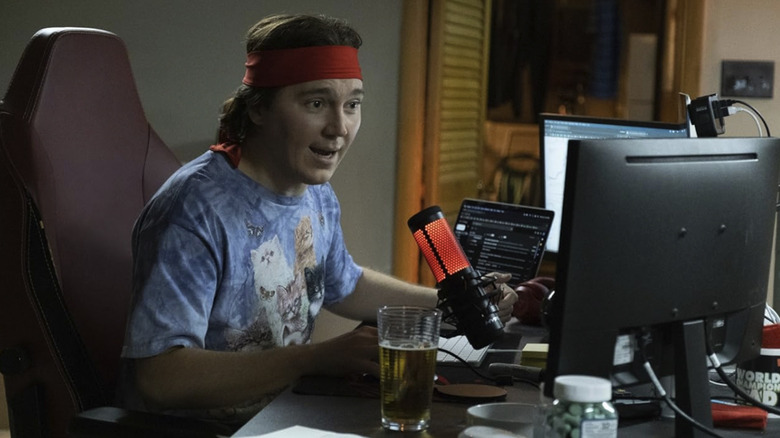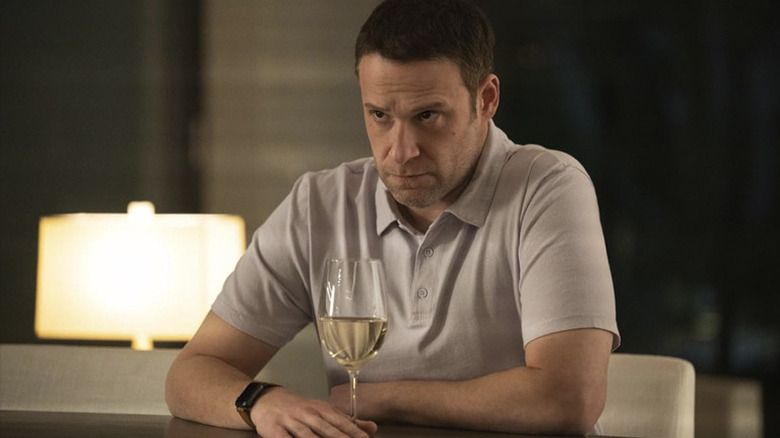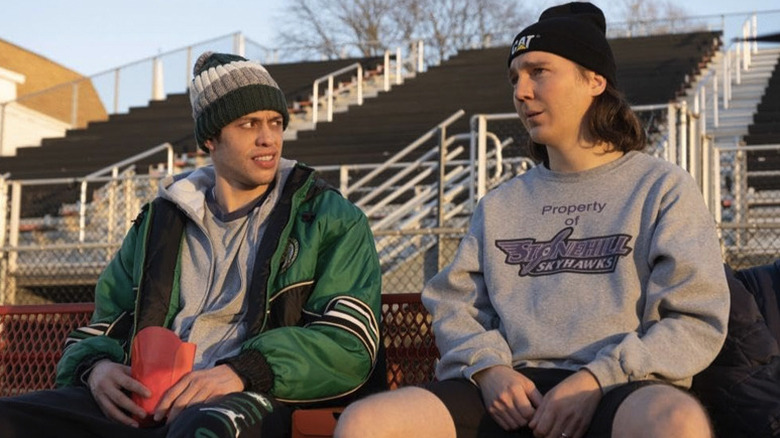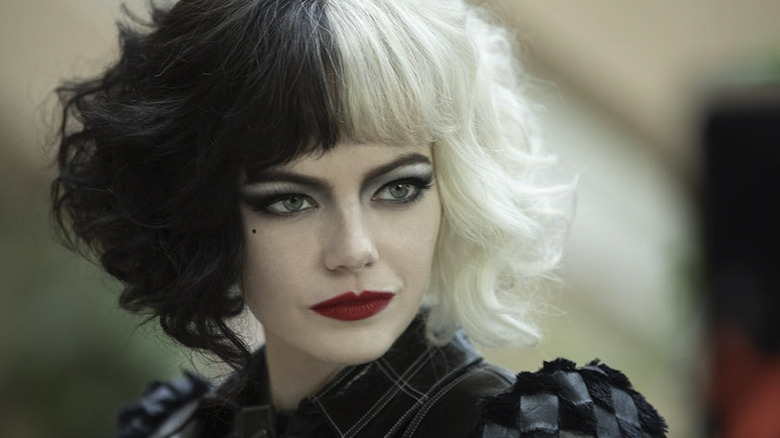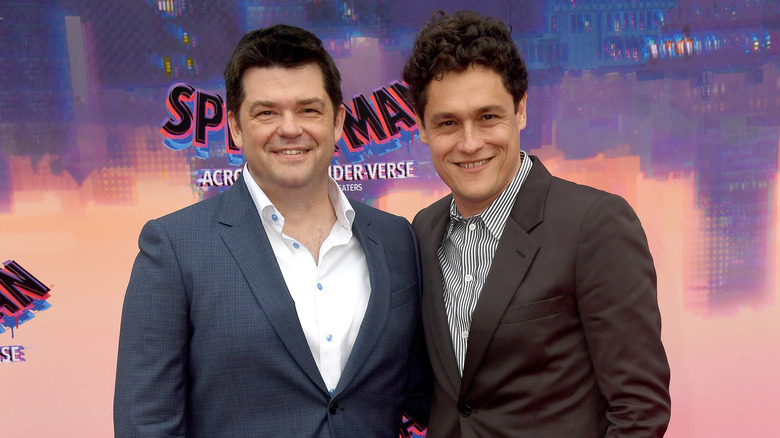Dumb Money Writers On The Big Short Comparisons And Elevating TikToks To Cinema [Exclusive Interview]
I've interviewed a lot of people this year for /Film, but none better reflected the energy of the film they wrote than Lauren Schuker Blum and Rebecca Angelo, the screenwriters of "Dumb Money." Their enthusiasm and rapid-fire speech patterns, in which they frequently were so excited that they'd finish each other's sentences, was infectious to listen to, and it perfectly aligned with the way their script (and director Craig Gillespie and his editors) unspooled the chaos of the GameStop stock story for the big screen. It also indicated a deep level of comfort these two have with each other as co-workers: Through collaborating together for over ten years, first as investigative journalists and then as screenwriters, they've formed the type of mind-meld that sounds familiar if you've ever read about how the Coen Brothers make decisions on set. There's a shorthand on display, and they each possess the same exact crystal-clear picture of what they're doing — so much so, it seems that clarity is embedded in their bones.
During our conversation, we spoke about the pressure they were under to deliver their script before industry competitors, the challenges of crafting a film in which most of its main characters never meet, their planned reunion with Craig Gillespie for "Cruella 2," their ideas for a "Murder, She Wrote" movie, and more.
Note: This interview has been lightly edited for clarity and brevity.
'Write this as fast as humanly possible, but also make it perfect'
I remember a swirl of projects being announced or rumored almost in real-time as the GameStop phenomenon was happening. So Lauren, at what point in that process did you two get hired to write this, and what kind of pressure were you under to turn in drafts quickly to beat these other projects to market?
Schuker Blum: We were definitely hired after the swirl because we were very aware of it –
Angelo: Yeah, and all of this happened in such an attenuated timeframe. The primary events of the story took place in January and February of 2021. Hollywood discovered it, I think we were also in the middle of a pandemic where everybody was just like, "What the f**k is going on?" And just massive herding events happening, just people getting super excited and going all in on something. This story, in its roughest outlines, you understand why it's catnip for Hollywood, because it's a David and Goliath story. It's a story about the little guy, or in this case, thousands or even millions of little guys coming together and notching a meaningful victory.
Schuker Blum: Hollywood loves an underdog story. And then we were approached by MGM, and we'd obviously been following the story. We wanted to write something about it, and it felt lucky that they came to us.
Angelo: We've a little truism about our career, which is there's no one we idolize more than Aaron Sorkin, and we have found ourselves in the lucky position of being kind of a second choice to him. So like with other projects, this one went to Sorkin first, when MGM got the rights to Ben Mezrich's book, and anytime there's something that we're really, really excited about, we just have to hope that it's not quite good enough for Sorkin. [laughs]
Schuker Blum: So MGM came to us and they were like, all right, you're hired as long as Aaron Sorkin passes. So we waited for that, and then we were sort of told, I think we were partially hired — we were screenwriters, but we were reporters and daily journalists in a different lifetime.
Angelo: For the Wall Street Journal, investigative reporters.
Schuker Blum: 12 years ago. So writing this, we wore two hats: Our daily journalist hat, and we got a draft very, very quickly. And then we also had our screenwriter hat on, and we were kind of told, "Write this as fast as humanly possible, but also make it perfect, because it has to beat out these other projects."
Angelo: Yes, exactly.
Schuker Blum: So we're doing it as fast as possible and also aiming for perfection at the same time.
'Yes, that is the right way to approach this'
You mentioned Ben Mezrich's book. Was that helpful for you two at all when writing the screenplay, or because that was written for a different medium, did you kind of feel like you were on your own, in a way?
Schuker Blum: Ben is the fastest pen in the West –
Angelo: He really is, and he's an extraordinarily generous and lovely collaborator.
Schuker Blum: Yeah, we had his book I think by March or April, the whole book, and we also were emailing with him, so that was very useful. I think the structure of Ben's book was an ensemble, and we thought that was a great way into the story.
Angelo: Yeah. It was a key early decision that Ben came to, and when we saw it, we were like, "Yes, that is the right way to approach this."
Schuker Blum: And there were characters. Obviously, Roaring Kitty was the center of Ben's book, and America Ferrera's character is based on a character in Ben's book –
Angelo: A wonderful woman named Kim, who we've gotten to know who was at our New York premiere. And then of course, we went off and did our thing, which was to talk to dozens of retail traders, people on WallStreetBets, and on Reddit, and also to talk to dozens of people in the world of finance.
Schuker Blum: And the thing was is that this story went on far past when Ben finished his book. So we sort of had no choice but to do that. We talk about how writing this screenplay was like getting on a rollercoaster halfway through the ride. There was the fallout from the hearings that Congress did. There was the SEC investigation. There were all these things that were happening in the wake of GameStop. There's even been policy change that happened three weeks after our movie came out.
Angelo: Yeah. One thing that was really exciting and gratifying is that after the GameStop saga happened, there was lots of handwringing in Washington about how to prevent something like this from happening again and how to control the practice of shorting, or at least influence the practice of shorting so that it is a little bit less predatory –
Schuker Blum: And Gary Gensler, with the SEC, had vowed to make Wall Street more transparent in the wake of what happened with GameStop.
Angelo: And then one week after our wide release, the SEC did a major policy change requiring hedge funds like the ones depicted in our movie, to be much more transparent with much more frequency about their short positions.
Schuker Blum: Anyway, so it's all to say the story just is continuing. So we did a ton of research, and one of the challenges was figuring out where to end the movie, because the story is ongoing and you've seen other stocks kind of step into this in terms of people going nuts.
'It was important to us that the movie have an anthemic quality'
So how different is the final movie from the draft that you handed in right before production began?
Angelo: Not that different, honestly. We slapped the title on the movie on our first draft, and it somehow survived so many different voices in the room and went from MGM to independent financing to Sony –
Schuker Blum: Yeah. And many of the music cues were the same –
Angelo: I think when we came into the project, the question that loomed largest was, "How is this in dialogue, but different from 'The Big Short?'" Obviously, there's a lot of common DNA, and Lauren and I spent a lot of time studying this movement and looking at not just the great financial films, but also the work of Frank Capra and the tradition of populist cinema. And the idea that we had was, where the great financial films were kind of told from the top down of the geniuses in the world of finance who saw something before others did — at least in the case of "The Big Short" — this is really a grassroots movement. This is a bottom-up story. So we wanted to find a device or some sort of screenwriting technique that we could use to bring an audience through the more complicated aspects of this story without ... I mean, [Adam] McKay already did Margot [Robbie] in a bathtub.
What we found was these concepts seem so opaque and impossible to understand, but actually what was happening and what fueled this movement was that regular people were explaining these things to each other on social media. And we thought, "What is a more radical, Capra-esque gesture than to elevate a dashed-off TikTok from a college student bored during the pandemic to the stuff of cinema?" So from the first draft of the script, and obviously it evolved, but Lauren and I compiled and watched every TikTok, every YouTube video, every meme and GIF we could find, and wrote and transcribed and wrote them into the script right alongside monologues to be delivered by America Ferrera and Paul Dano.
Schuker Blum: So all those TikToks in the movie are real. We also — I think part of why the script didn't change that much was this is a movie about people who don't meet, are never going to meet, and are never in the same room.
Angelo: It's the least cinematic setup for a film, even though emotionally and energy-wise, it's a great story.
Schuker Blum: So because of that, in order to write an emotional story about people who don't meet, we had to make the script really painstaking and detailed in terms of the transitions. And it's a French braid, essentially. So we have characters who are arguing across scenes. So one character says something and then another character in a new scene in a different part of the country finishes that sentence. And Craig, to his credit, really preserved that technique. So at the beginning of the film, you see Paul Dano's character running on the track, and you see Seth Rogen's character, the Wall Street guy, also running through his mansion. And Craig preserved exactly the cuts we wrote into the screenplay in order to preserve these dialogues.
Angelo: It was important to us that the movie have an anthemic quality because this really is about an army massing, and it's funny that it took place — or, not funny, but it makes a lot of sense that it took place during Covid because that was a time of viral spread, but also the spread of ideas that mapped in a very similar way. So we tried to render on screen that feeling of how something gained steam, how people come into a movement, how it builds and builds. And those kinds of techniques that Lauren was just describing, the running, the running, the beginning of thought, and then finishing it, the emotional connections and the passion and the antagonism that builds between people who are never in the same room, never in the same state –
Schuker Blum: And even the kind of connection. Like right now, we're talking to you on Zoom, we can make eye contact. We wanted to build a moment like you have in an old Western, where you have your hero and your villain face off. So we built that through a screen when we have Seth Rogen stare to Paul Dano's eyes, stare into Roaring Kitty's eyes, and say, "Who is this schmuck?" It's this incredibly emotional moment, but it's through a computer screen.
Angelo: And it sets up two gunslingers preparing for a duel, but it's mediated by a screen.
'I feel like our only mandate there is just to let Cruella be as Cruella as possible'
I know that you are supposed to be reuniting with Craig for "Cruella 2."
Angelo: Craig never gets far from us.
I'm guessing you probably can't tell me much about that, but what can you tell me about how you're going to continue that story?
Angelo: Craig found, and Tony McNamara, who wrote the first one with other collaborators, found an extraordinary tone. I mean, it is a tightrope to take an anti-hero like that and make her the star of a Disney franchise. We are super honored to be stepping into the next phase of that and working with Craig to make her as wicked, as wickedly funny, to honor the DNA and the history of it, and also to bring her to even greater heights and new adventures.
Schuker Blum: I feel like our only mandate there is just to let Cruella be as Cruella as possible.
Angelo: Yes.
I believe you're writing a "Murder, She Wrote" movie.
Angelo: Yes, we can talk more about that. A little bit more.
So what can you tell me about your take on bringing that to a modern audience?
Angelo: That has been the love of our lives for the last couple of years. We were both kids who were suburban kids who just grew up watching "Murder, She Wrote," and anything else that broadcast TV fed to us.
Schuker Blum: And I think we always credit curious women like Jessica Fletcher for why we became journalists initially.
Angelo: It's been really fun to take a character who was constrained by the limits of broadcast television in the eighties and nineties — she's not allowed to have too much depth, she's not allowed to have an emotional arc, she's certainly not allowed to make mistakes — and to imagine, in 2023, the possibilities of that character. So we would never dishonor Jessica Fletcher. In fact, the opposite. We have watched every episode two or three times. We know the ins and outs of that character and Cabot Cove. And the idea is to render that in three dimensions worthy of movie theater screens. A real event that people are going to put on their cardigans, hopefully, and go see.
Schuker Blum: Yes, Cabot Cove will be a big part of it, and Jessica. All the kind of fan favorites.
'What we're actually looking for is an emotional story and a human connection with these characters'
You're also attached to a movie version of "The Premonition: A Pandemic Story." We were talking a little about the pandemic earlier, but from my perspective, it seems like society kind of wants to forget about the pandemic and basically pretend that it never happened. So does that provide a challenge for you?
Schuker Blum: Yes! As people who were reporters, we grew up worshiping Michael Lewis. I feel like the theme of today is we just we're in this moment where –
Angelo: As the characters of "Dumb Money" would say, "Holy f**king sh*t." How did we get –
Schuker Blum: Yes, I think we've gotten to work with, I think, a lot of our heroes, right? Or write about Jessica Fletcher. We're adapting a Michael Lewis book. That was a lifelong career dream and he's extraordinary. But yeah, I think everything you said holds true, and that book features some incredible characters.
Angelo: And also — I agree with you. Nobody wants to talk about the pandemic. I don't think we really want to talk about the pandemic. We certainly don't want to live in that world. But as with "Dumb Money," as with any project we do, what we're actually looking for is an emotional story and a human connection with these characters. And not just with the main character, but with every character that we're rendering on screen. So your antagonist, your peripheral characters, they all need to be dimensional and they all need to have a real strong human pull to them. It was a challenge with "Dumb Money" because this is essentially a pandemic story. I mean, this is not a story that happens without people being locked in their homes, feeling so isolated and so small, and finding this outlet to come together and to become part of something bigger than themselves.
Schuker Blum: Every scene in "Dumb Money" touches on the pandemic in some way, even though we don't use the word "Covid."
Angelo: And the thing about "The Premonition" is that it is about, at its very essence, seeing something coming that nobody else sees. The very notion of a premonition. And I think that is really sticky, really timeless, and at the same time, so it feels so urgent right now, where people are waving their hands and screaming about climate change, waving their hands and screaming and feeling like they're just shouting into a void. So that idea feels like something that we can hook into and get really excited about and write a Lord and Miller movie that maybe isn't into the nitty-gritty of social distancing.
Schuker Blum: It's also an extraordinary story about people who think differently. And that's what we were drawn to. Like in ["Premonition" protagonist] Charity Dean, one of the greatest characters of all time.
Angelo: And not dissimilar from Roaring Kitty and from other true stories that we've adapted for the screen where this is an outsider, this is a misunderstood person, this is an underdog. This is a reluctant leader who finds themselves in extraordinary circumstances and forced to rise to the challenge.
Schuker Blum: But it is a challenge. And I think as screenwriters, we are drawn to that. If someone's like, "Well, this is impossible," we're running to do it. And particularly stories that I think don't necessarily seem cinematic from the outset, we're attracted to the challenge of how to translate that for the screen and go back to historic works, like Capra films, and look at, "How do we update these things for our time?"
Angelo: Also, it just explains why we've been doing this for 11 years and could paper the walls of this room with scripts that haven't gotten made. And why "Dumb Money" is our first movie.
Well, I look forward to seeing how you all pull it off, because I'm excited to watch the rest of your career as it moves forward. I mean, like you said, this is the first one out of the gate, but you've been going for a long time.
Schuker Blum: Hopefully, it's not like 2035 by the next one. [laughs]
"Dumb Money" is available now on Blu-ray, DVD, and VOD.
